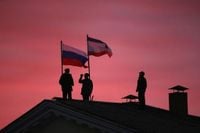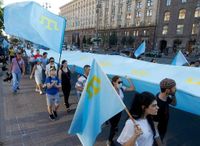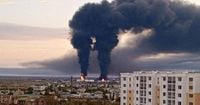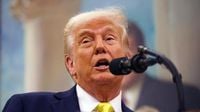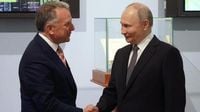The United States is prepared to recognize Russia’s control over Crimea as part of a broader peace agreement between Moscow and Kyiv, according to a Bloomberg report on April 18, 2025. This potential concession indicates President Donald Trump’s eagerness to secure a ceasefire deal amid escalating tensions in the region.
Trump and U.S. Secretary of State Marco Rubio emphasized on the same day that the administration may abandon its peace-brokering efforts if negotiations fail to progress soon. The urgency of the situation is palpable, as Trump remarked, "If either party behaves stupidly, we are ready to leave the negotiation table." This statement underscores the administration's frustration with the stalled talks.
The conflict over Crimea began in late February 2014 when Russian troops, without military insignia, invaded the region. By March 2014, the Russian-controlled Crimean parliament voted to hold a controversial referendum to join Russia. The voting, conducted in the presence of armed Russian soldiers, was widely criticized as a sham, with the Russian government claiming that 97 percent of voters supported annexation. However, numerous international reports have proven that these results were fabricated.
Recognizing Russia’s control over Crimea would mark a significant victory for Russian President Vladimir Putin, who has long sought international legitimacy for the territory. Ukrainian President Volodymyr Zelensky has consistently stated that Ukraine will not cede any part of its territory to Russia, a sentiment echoed by the majority of Ukrainians.
Despite Trump's push for a peace agreement, Putin has so far rejected the broader peace proposal put forth by the U.S. This has left many observers questioning the feasibility of a resolution. A U.S. official familiar with the negotiations declined to comment on the possibility of recognizing Crimea, citing the sensitivity of the ongoing talks.
As the conflict continues, the U.S. has presented its vision for ending the war during meetings in Paris. This proposal reportedly aims to freeze the conflict, allowing Russia to maintain control over occupied Ukrainian territories. Additionally, Ukraine's aspirations to join NATO would be excluded from the discussions, and easing sanctions against Moscow is being considered.
In the meantime, the situation in Ukraine remains dire. A drone attack on Zaporizhzhia recently caused a fire in the city, with Ivan Fedorov, the head of the Zaporizhzhia Regional Military Administration, stating that "The Russians attacked the regional center with Shahed drones." This incident reflects the ongoing violence that continues to affect civilians in the region.
As the U.S. aims for a complete ceasefire within weeks, the path forward remains complicated. While Zelensky has accused the U.S. of supporting the Russian narrative on the war, he is also preparing to negotiate a minerals agreement in Washington next week, aiming to conclude talks by April 26, 2025.
The next few weeks will be crucial in determining the outcome of the U.S. diplomatic initiative for a truce in Ukraine—the most concrete and constructive effort in over three years of conflict. The stakes are high, and the international community is watching closely as the U.S. navigates this complex situation.
While Trump has expressed optimism about the potential for peace, he has also indicated that if an agreement is not reached, the U.S. may withdraw from negotiations altogether. This sentiment was echoed by Rubio, who noted the need to evaluate the feasibility of peace in the coming days.
Despite the bleak outlook, there have been hints of progress. The Kremlin has acknowledged that negotiations remain complicated, yet it has not ruled out the possibility of reaching an agreement. Meanwhile, the Ukrainian government continues to seek guarantees of security to ensure any deal holds firm.
As the conflict rages on, the humanitarian toll is mounting. Recent raids in Kharkiv resulted in one death and over 70 injuries, including five children. Zelensky condemned the attacks, stating, "This is how Russia began this Good Friday: with ballistic missiles, cruise missiles, and drones. The mockery of our people and cities continues."
In light of the ongoing violence and the complexities of the negotiations, the U.S. finds itself in a precarious position. With Trump’s administration facing pressure to act decisively, the future of peace in Ukraine hangs in the balance. The international community remains hopeful for a resolution, but the path to peace is fraught with challenges.
As talks continue, the dynamics between the U.S., Russia, and Ukraine will play a pivotal role in shaping the outcome of this conflict. The coming weeks are expected to be critical in determining whether a ceasefire can be achieved or if the situation will further deteriorate.
